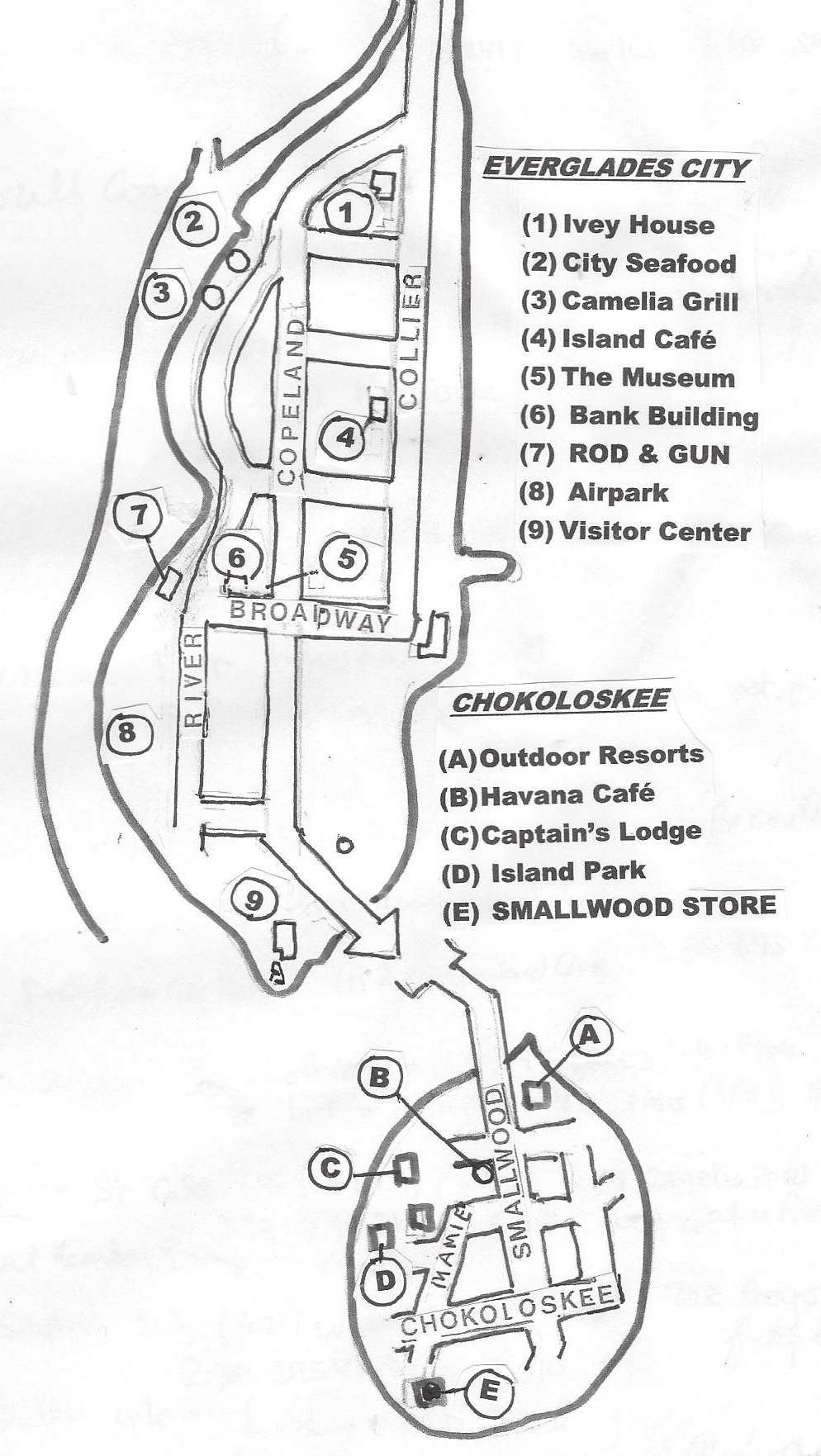EVERGLADES CITY and CHOKOLOSKEE
FLORIDA'S LAST FRONTIER
EVERGLADES AREA INFO *** MUSEUM OF THE EVERGLADES
EVERGLADES CITY and CHOKOLOSKEE, at the entrance to the
Western Everglades, were two frontier outposts
frontier outposts until 1923 when Barron Collier made Everglades
City the seat of Collier County
and supply depot for the construction of the Tamiami
Trail. Prior to the boom, this isolated region was Florida's last outpost for fur trappers,
plumage hunters, Cuban fishermen, and people with a disdain for modern
civilization. Even today the small population depends upon fishing, boating, and providing those services to mostlt winter visitors and residents who like to fish and boat. You'll think half the population are offering airboat and boat rides into the Everglades.
WHERE TO START: Everglades City can only be reached by BOAT or DRIVING SOUTH ON
FL29, past the historic buildings many built in the 1920s, a pride of a
town that has lost population since World War II. Collier Avenue can actually get busy in winter, but if you turn right (west) on Begonia and Copeland along the riverfront. You'll notice houses on stilts and
air boat rides along the river. Here are waterfront seafood restaurants where many of the fishing boats are owned by the restaurant owners. If you are hungry, it is a good place to have lunch.
If you went straight down FL29, YOU SHOULD TURN RIGHT ON BROADWAY (the town's main east-west road) , which heads toward the Spanish-style railroad depot with its
barrel tile roof and past the frame Community
Church. You won't miss
the OLD COLLIER COUNTY COURTHOUSE, a 1926 four-columned temple
that seems totally atypical for a frontier village. Yet Everglades City once outpopulated Naples.
At Shorter
Avenue and Broadway Avenue is the (1) COMPANY
LAUNDRY BUILDING
(1928) and the (2) BANK OF EVERGLADES
(1926). The pink building at 105 Broadway has a new use: it is the delightful MUSEUM OF THE EVERGLADES and it is a nice place to visit.


EvergladesBankIs Now A
HotelEverglades Museum


Everglades Rod and Gun Club ***Interior RoomFlorida
<
You probably wondered about the place you passed on the waterfront. At 200
Riverside Drive by Broadway is the wonderful ROD
AND GUN CLUB (1890), built by Collier to entertain friends but
expanded to serve tourists. It is located where Bill Allen built a house in 1870 and where George Shorter had a trading post that Collier expanded. Go inside and imagine Ernest Hemingway and Ted
Williams have a drink at the bar after a serious day of bone-fishing in the Ten
Thousand Islands. This is a unique place to stay or eat or rent a boat. It is very rustic but they don't take credit cards (at least not in the restaurant).

CONTINUE SOUTH ON FL29 to reach CHOKOLOSKEE ISLAND, but stop at the
80-foot E. J. HAMILTON OBSERVATION TOWER for a view of the 10,000 Islands or
visit the EVERGLADES VISITORS CENTER, which has boat tours into the
Everglades' Western limits. In fact, both towns are filled with locals offering boat and airboat tours. The Everglades and fishing are the top local industries.
This area of Florida still has the
feel of pioneer days, but please remember that between May and October, the tropical areas are the domain of
mosquitoes and bugs. CHOKOLOSKEE
ISLAND is a
150-acre mound in a shallow inland sea. Follow the signs to the amazing (3) SMALLWOOD
STORE (1906), a one-story board and batten trading post on pilings. Ted
Smallwood once ought the entire island in 1896 and his structure was grocery,
post office, and symbol of the end of the Florida West Coast. If you look up this place on the Internet, you will discover one of Florida's most famous ambush took place here. It was not about Seminoles, but the area bully who some believe turned innocent travelers into slaves at this farm.

 Ted Smallwood standing by his store
Ted Smallwood standing by his store
Smallwood Store
The rest of the island consists of fishing
camps, mobile homes, and the remnants of Calusa
mounds. If you have not had lunch, you might wish to see if HAVANA CAFE OF THE EVERGLADES at 191 Smallwood Drive, is open. Their outdoor patio is in a rustic garden.








 Ted Smallwood standing by his store
Ted Smallwood standing by his store